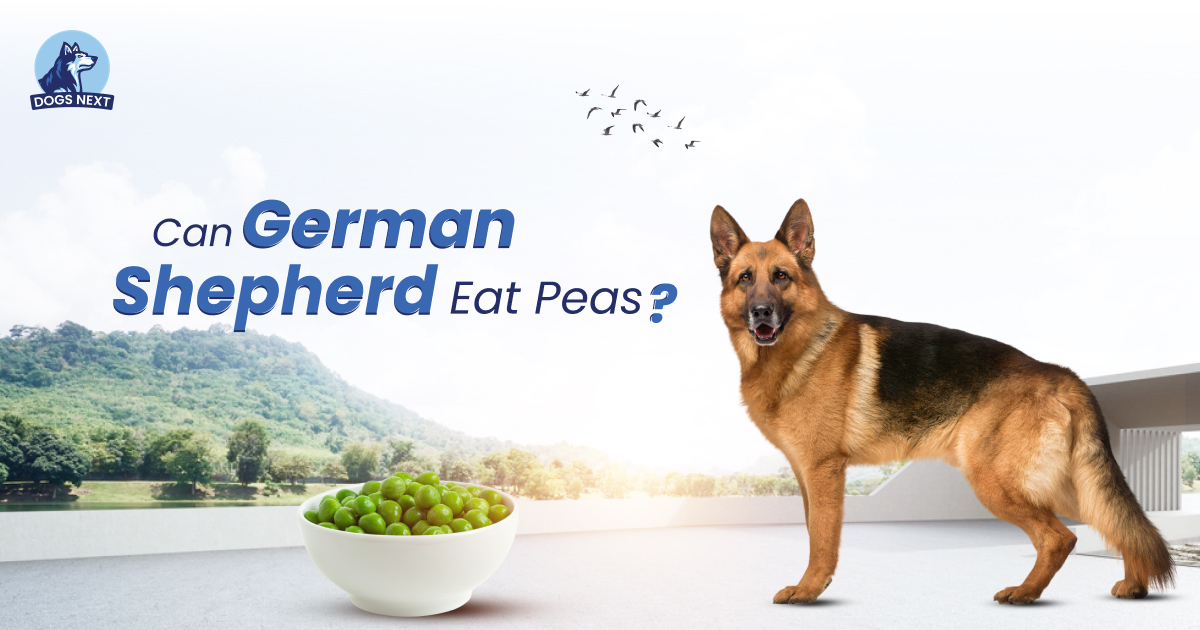Yes, Peas are a good source of fiber, vitamins, and minerals, and they can be a healthy addition to a German Shepherd’s diet. After all, peas are an excellent vegetable that many of us enjoy and may seem like a healthy option.
In this article, we’ll explore the benefits and risks of feeding peas to German Shepherds and guide how to properly prepare and serve them. Whether you’re looking for ways to add more variety to your dog’s diet or want to ensure you’re not feeding them something that could be harmful, this article will provide you with the information you need to make an informed decision.
Table of Contents
Nutritional Needs of German Shepherds
German Shepherds are a large breed of dog that requires a well-balanced diet to maintain their health and energy levels. Generally, their diet should consist of high-quality protein, fat, and carbohydrates.
Here are some specific nutritional needs of German Shepherds:
Protein
German Shepherds require a diet high in protein, which is essential for maintaining their muscle mass and supporting their growth and development. Ideally, their diet should consist of high-quality animal-based protein sources such as beef, chicken, or fish.
Fat
While German Shepherds require a moderate amount of fat in their diet, it’s important to ensure that the fat comes from healthy sources such as fish oil or chicken fat. This will help support their skin and coat health, as well as their joint health.
Carbohydrates
German Shepherds require carbohydrates for energy, but it’s important to choose complex carbohydrates that are easy to digest and provide sustained energy. Some good sources of carbohydrates for German Shepherds include sweet potatoes, brown rice, and peas.
Overall, when choosing a diet for your German Shepherd, it’s important to consider their individual nutritional needs and consult with a veterinarian to ensure they are receiving all the necessary nutrients to maintain their health.
Benefits of Feeding Peas to German Shepherds
Here are some potential benefits of feeding peas to German Shepherds:
| Benefits | Descriptions |
| Rich in Nutrients | Peas are a good source of vitamins, minerals, and other essential nutrients that are important for your German Shepherd’s overall health. These include vitamin K, vitamin C, vitamin A, and iron. |
| Fiber | Peas are low-calorie vegetables and high in fiber, which can help regulate your German Shepherd’s digestive system and promote healthy bowel movements. This can be particularly helpful for German Shepherds that are prone to digestive issues. |
| Low in Fat | Peas are a low-fat vegetable, which can be beneficial for German Shepherds that reduce weight gain are overweight or are prone to obesity. Feeding your German Shepherd peas as a low-calorie treat can help them feel full and satisfied without adding extra calories to their diet. |
| Anti-Inflammatory Properties | Peas contain anti-inflammatory properties that can help reduce inflammation in your German Shepherd’s body. This can be particularly beneficial for older German Shepherds or those with joint issues. |
When feeding peas to your German Shepherd, it’s important to keep in mind that they should be served in moderation as part of a well-balanced diet. Peas should not replace a significant portion of your German Shepherd’s diet, but they can be a healthy addition to their meals or used as a low-calorie treat.
As with any new food, it’s always a good idea to introduce peas slowly and in small amounts to ensure your German Shepherd doesn’t have any adverse reactions. It’s recommended that, do not provide any frozen vegetables or canned vegetables to your dog! It can cause liver failure or make kidney stones in your dog!
Risks of Feeding Peas to German Shepherds
While peas can be a healthy addition to your German Shepherd’s diet, there are some risks to keep in mind:
- Digestive Issues: Peas contain oligosaccharides, which are a type of carbohydrate that can be difficult for dogs to digest. Feeding your German Shepherd too many peas or introducing them too quickly into their diet can lead to digestive issues such as gas, bloating, and diarrhea.
- Allergic Reactions: Some dogs can be allergic to peas, and feeding them to your German Shepherd can lead to allergic reactions such as itching, hives, and digestive upset.
How to Feed Peas to German Shepherds
To safely incorporate peas into your German Shepherd’s diet, follow these tips:
Introduce Peas Slowly
If your German Shepherd has never had peas before, start by introducing them in small amounts and gradually increasing the serving size over time. This will allow their digestive system to adjust to the new food.
Cook Peas Thoroughly
Cooking peas thoroughly can make them easier for your German Shepherd to digest and reduce the risk of digestive issues.
Monitor Your German Shepherd’s Reaction
Keep an eye on your German Shepherd after feeding them peas for any signs of digestive upset or allergic reactions. If you notice any issues, stop feeding them peas and consult with your veterinarian.
Serve Peas in Moderation
Peas should be served in moderation as part of a well-balanced diet. They should not replace a significant portion of your German Shepherd’s diet, and feeding too many peas can lead to digestive issues.
Can German Shepherd Puppies Eat Peas?
While peas can be a healthy addition to an adult German Shepherd’s diet, it’s important to be cautious when feeding them to puppies.
Peas are a good source of fiber, protein, and vitamins, but they also contain carbohydrates that can be difficult for puppies to digest. Feeding your German Shepherd puppy too many peas or introducing them too quickly into their diet can lead to digestive issues such as gas, bloating, and diarrhea.
If you want to feed peas to your German Shepherd puppy, it’s important to do so in moderation and under the guidance of a veterinarian. Start by introducing them in small amounts and gradually increasing the serving size over time.
Monitor your puppy’s reaction and if you notice any digestive issues, stop feeding them peas and consult with your veterinarian.
The alternative of Peas for German Shepherds
If you’re looking for alternative options to peas, here are some other healthy foods that you can feed your German Shepherd:
- Green Beans: Like peas, green beans are a good source of fiber and vitamins, and they’re low in calories. They’re also easier for dogs to digest than peas.
- Carrots: Carrots are a good source of vitamins and minerals, and they’re also low in calories. They can be served raw or cooked.
- Sweet Potatoes: Sweet potatoes are a good source of fiber, vitamins, and minerals, and they’re also low in fat. They can be served cooked or mashed.
Pumpkin: Pumpkin is a good source of fiber and can help regulate your German Shepherd’s digestive system. It can be served cooked or canned.
Frequently Asked Questions
Q: What veggies are good for German Shepherds?
Ans: Some veggies that are good for German Shepherds include carrots, sweet potatoes, pumpkin, and green beans.
Q: Can German Shepherds eat green beans?
Ans: Yes, German Shepherds can eat green beans as they are a good source of fiber and vitamins.
Q: Can German Shepherds eat broccoli?
Ans: Yes, German Shepherds can eat broccoli in moderation as it contains essential vitamins and minerals, but it may cause digestive issues if fed in excess.
Conclusion
In conclusion, German Shepherds can eat peas as part of a balanced and healthy diet. Peas are a good source of fiber, protein, and vitamins, and they offer a range of benefits for your furry friend. However, it’s important to be aware of the potential risks and to feed them in moderation.
In addition to peas, there are other healthy food options that you can feed your German Shepherd, such as green beans, carrots, sweet potatoes, and pumpkin. By providing a variety of nutritious foods, you can help support their overall health and well-being.

I’m David, an expert contributor and writer, with two furry friends of my own, I know the challenges of raising and caring for dogs. From training to nutrition and health, my goal is to provide valuable insights and advice to help create strong bonds and happy, healthy lives. Find me in Twitter.




